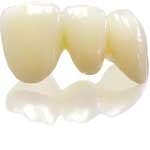A different perspective: A dentist and psychologist talks about patient relationships
Feb. 13, 2012
By Kevin Henry
Managing Editor, Dental Economics
Managing Editor, Dental Economics
Editor’s Note: Dr. Hugh McDougall of Tulsa (left) is the only dentist in Oklahoma to be licensed to practice psychology, and is one of only 10 dentists nationwide to be dually licensed in both dentistry and clinical psychology. With this interesting background, I thought Dr. McDougall could provide a different viewpoint when it comes to the mindset of the patient and relationships within the practice.Kevin Henry: With your unique dual background as dentist and psychologist, how does your practice differ from many of your colleagues?Dr. Hugh McDougall: None of what we do inside our practice is strikingly different than what is done in other practices. We understand that many of our patients employ defense mechanisms when it comes to being at the dentist, so we emphasize the patient having a positive experience. We want to empathize with the patient because we know it’s often a real trial for him or her to come into our practice. Because of that, we have a tremendous respect for our patients.We want to understand their thoughts, feelings, and behaviors, and we do that by focusing on listening to them. People will often hear what a person is saying, but will they really listen? We practice a technique called “reflective listening.” It’s so fundamentally simple, but very effective because patients really know that we have heard them. We listen, then paraphrase what our patients have said to make sure that we have understood what they’re saying.During a procedure, my assistant maintains a dialogue with our patients. I am focused on the clinical part of the procedure, and my assistant is very practiced and knows exactly what we’re doing. If there’s any chance of the patient feeling anything, including pressure, she lets him or her know ahead of time.Everyone in the practice has to be on the same page, and the patient needs to hear the same message from everyone throughout the appointment. If there is consistent dialogue from every member of the team, that is terrifically helpful for the patient.Henry: Many dental practices are now working hard to make their practices seem like anything but a dental practice. What thoughts do you have on that?Dr. McDougall: I don’t think it’s helpful to avoid the issue of being in a dental practice. If a patient has had a bad dental experience before, many practices don’t want to bring it up because it might spark a concern in the patient. We’re different because we always ask patients if they have had a bad experience. If they have, we try to address it completely by talking with them at length before the first appointment, and we want to be very sensitive to that. We’ll address those past concerns every time that patient comes in, and we definitely see the apprehensions decreasing each time that patient comes in. We’ve seen people go from being adamant about using a mild sedative or nitrous oxide to graduating from it completely.Patients want the dentist and team to know that they have concerns. If those concerns aren’t being addressed, that’s not good for the patient. Those concerns are directly related to a patient’s comfort level in the practice. You always want the patient to know that you truly care.We also allow a patient to stop us during a procedure if he or she is uncomfortable. I’ve talked to many patients who have wanted a procedure to stop in the past, yet the dentist went ahead and finished. That’s a huge memory for the patient. You may have finished the procedure, but you’ve lost a patient. We’ve found that if we give patients the control to stop the procedure, they’re reluctant to stop unless they’re really uncomfortable. I think it’s so important for dental practices to have good anesthetic in place and really give it time to take effect before starting a procedure.We’re very careful with the phrasing that we use in the practice as well. We generally don’t say the word “pain.” In our office, we want to emphasize “comfort.” We want to get the word “comfort” in the mind of our patients as much as we can.Henry: What do you see as one issue where dentists could use some outside assistance from a psychologist?Dr. McDougall: I think one thing that hurts so many practices is conflict and how it’s resolved. As a psychologist, I know that dentists shy away from conflict resolution because we have no training in that field. As dentists, our tendency is just to deny that anything is happening. That may temporarily resolve the problem, but the core issue is still there.It’s helpful to understand where the problem is coming from and get those individuals together to address the problem and resolve it. If it can’t be simply resolved, I hope that dentists would call in someone to help, such as a psychologist or trained mediation specialist. We call in specialists all the time to help with procedures that fall outside our comfort level. Why wouldn’t we do the same with conflict resolution?
For more information on Dr. McDougall and his practice in Tulsa, log on to www.mcdougalldds.com.
For more information on Dr. McDougall and his practice in Tulsa, log on to www.mcdougalldds.com.






